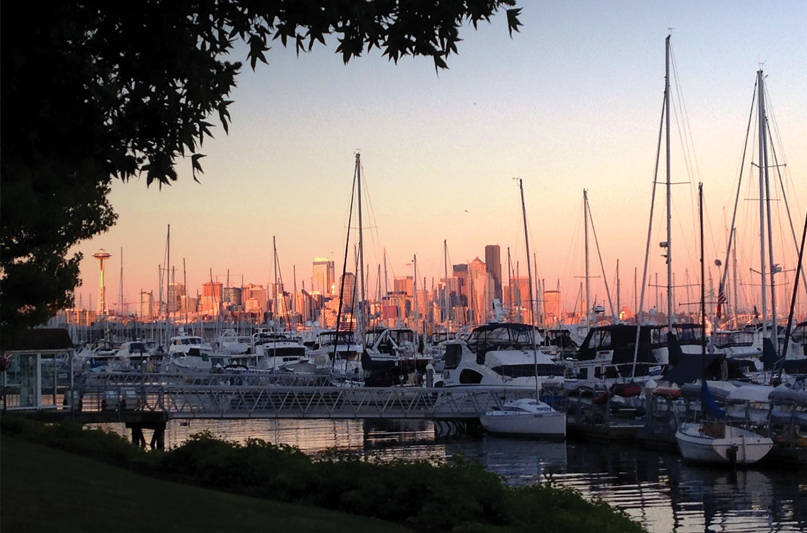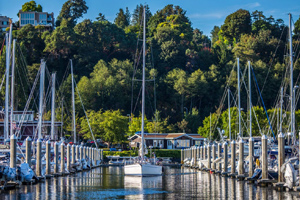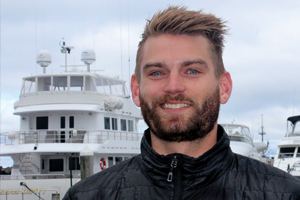
“Distrust and caution are the parents of security.”
– Benjamin Franklin
Generally, there are lots of expensive toys aboard even a modestly-sized boat, and wherever nice things exist, there will be those looking for their shot at a five-finger discount. The pair of paddleboards your significant other bought last Christmas or that brand new downrigger can be mighty tempting, especially if you’re dipping in and out of different marinas, fuel docks, and anchoring fields during your adventures.
Boat security as a concept is a giant subject that includes conversations ranging from the use of padlocks to packing heat aboard. Remote sensing systems are becoming increasingly user-friendly, efficient, and affordable as well. Cameras are appearing on smaller yachts and systems that manage a dozen sensors at once can alert you to an issue almost instantaneously via text. It’s a brave new world in a lot of ways, and boaters should probably take a reflective look at their boats and think about what security measures are right for their situation.
Of course, the best defense of all is choosing a good marina with an active clientele to channel that neighborhood watch energy. To learn more about the subject of boat security, we talked to Brandon Baker, longtime manager of Elliott Bay Marina in Seattle, Washington.
NWY: Generally speaking, do you have any security tips for boaters?
My advice to our boaters is to always do more upfront and to be proactive when protecting things on board. For example, for fishing boats with several downriggers and rods, it’s always safer to keep those expensive pieces of equipment locked up or put away. Don’t leave that kind of gear out on the deck to entice anyone.
We also encourage boaters to keep any eye out on the docks for anything that doesn’t look right. We want our boaters to call the office, available 24 hours a day, so we can get a heads up and come down to take a look. Encouraging boaters to keep their eyes out for each other and lock away loose valuables are two big pieces of security advice for boaters.
NWY: You mentioned the community as a security asset. In your experience, do fellow boaters provide a reliable line of defense against crime?
Definitely. In fact, boaters tend to err on the side of being overprotective about reporting anything suspicious on our docks. Maybe things get called in that don’t turn out to be an issue, but we always respond to every call just in case, and overall, it’s a good thing.
The culture is that everyone is looking out for one another. We don’t have many liveaboards, who can also be a helpful asset, but we still have eyes on the dock that are helpful. We manage an 11-acre property, so it can always be a challenge to have our staff monitoring everything at once. Enlisting our boaters to help has proven to be successful.
NWY: Locked gates are a marina standard around here. What are typical effective practices with regards to those gates?
There are a couple of ways to do it. We utilize codes that are only good for 24 hours for use with hired venders and the like. These vendors register with us daily as well, checking in and out. This helps us keep tabs on who should be in the marina and control the traffic of non-clients. We also have a separate set of guest codes that are separate from everyone else. Again, that way we can change those as needed.
For boaters we have key fobs in addition to codes, unique to each slip. We can also keep track of the number of transactions of the fobs and codes with the gates. We can spot over-usage, which can signal that somebody who doesn’t belong may have gotten their hands on an access code.
Another issue marinas are experiencing in Seattle, with more people on the streets, are securing the warm bathrooms with hot showers. We don’t want our facilities to be abused by non-clients either, so we have fob-only access there as codes can be more easily guessed. Places that require extra security, like the bathrooms, tend to have cameras trained on them as well as an extra precaution.
NWY: In some places, outboards can be prime targets for theft. Is that an issue in your experience and what should boaters do in response?
That’s not an issue I’ve ever personally dealt with. The closest thing I’ve seen to that is kayaks going missing. That being said, there’s nothing wrong with using a bike lock for that extra peace of mind.
NWY: Every once and a while, the internet blows up with a boat owner’s private onboard camera catching an intruding thief in the act. Do you have any thoughts on those kinds of cameras or remote monitoring systems?
We see those onboard cameras and vessel monitoring systems increasingly on larger yachts. For example, when we experience a rare power outage, we get lots of calls from users of monitoring systems that send them a text or email as a power outage alert.
I know there’s some companies out there that offer systems that are similar to home security systems. You can get a text alert for something as simple as a hatch opening, and basically put sensors on anything. One of the main benefits of some of these systems, that I’ve found in my research, is that there can be a small insurance break.
These systems are a little overboard for the average boater and for us. Security is top priority for the staff of Elliott Bay Marina and we do a good job. For boaters who may be out of town during the winter and may go six months without being aboard their boats, those monitoring systems can be helpful. A lot
of people use them to keep track of vendors doing work on their boats.
Bottom line, I wouldn’t say these monitoring systems are strictly necessary, but it can certainly be beneficial in certain circumstances. I wouldn’t say that everyone needs them.
NWY: Do you have a favorite among those monitoring systems?
I don’t have a specific endorsement at this time, I’m mostly drawing from some of my own research and conversations with some company reps. They all offer very similar services and capabilities.
NWY: Remote monitoring systems on the level we’re seeing today seem like a relatively new trend to me. Thoughts?
I first heard about them only a few years ago. Onboard monitoring systems have been around forever, but as far as the level we’re seeing today, I’d say they started popping up around five years ago and have only recently become mainstream.
It’s probably a function of the improvements in camera technology, Wi-Fi technology, smartphones, and more. It seems most cost-effective now, so maybe that’s part of why more people are using them.
NWY: Do you have any thoughts about developments in boat security in the near future?
I’ve heard a little bit about using geo-fencing technology, that’s existed for a while. I think the cost of these monitoring systems will continue to drop, making them more common in the boating sphere.
NWY: Do you have any thoughts about packing heat on board?
I do not bring guns on board, but I wouldn’t necessarily say it is a bad idea if you are properly permitted and experienced with firearms. Additional security is never a bad thing, but around the Puget Sound I can’t think of an area that brings much of a threat to recreational boaters.
NWY: Do you have any security considerations that are unique to the Pacific Northwest?
Off the top of my head no, but that doesn’t mean you shouldn’t always be vigilant of what or who is around you when boating and anchoring in harbors around the this region. Some of the strangest and scariest situations can happen out of nowhere and it is always good to be prepared and have an action plan.
NWY: Any final thoughts about boat and marina security?
Be proactive. We, and other marinas, will focus on security, but the staff can’t be everywhere at once. The harder you make for things to walk off your boat, the better.
Picking your marina is also another way to be proactive about security. We have a nightguard at the front door, 24-hour phone, etc. Keep security on your list of marina priorities as a boater, good marinas do good work.

